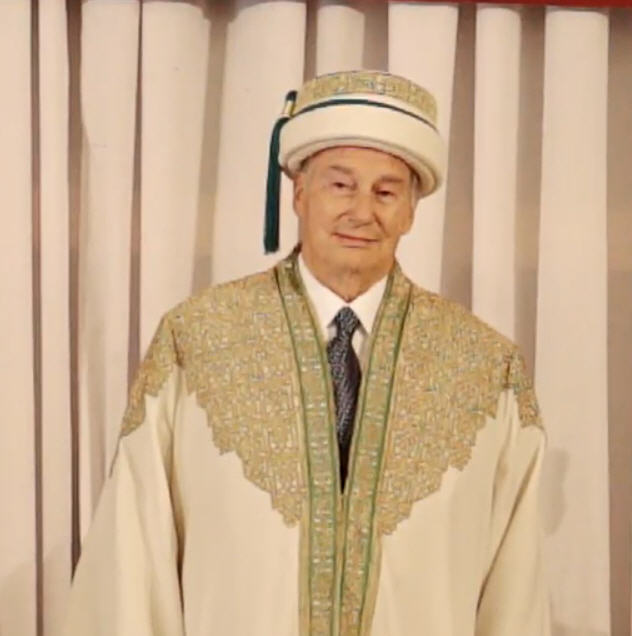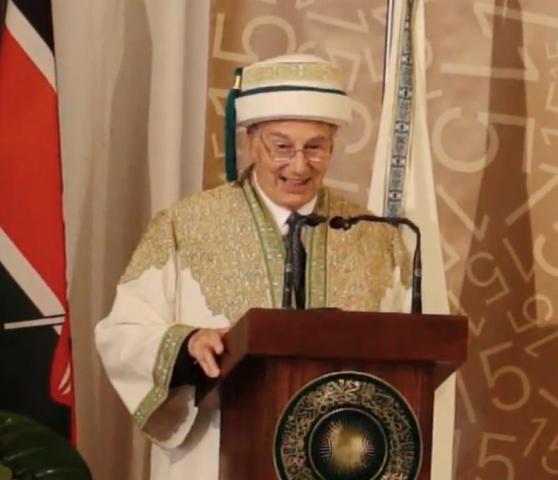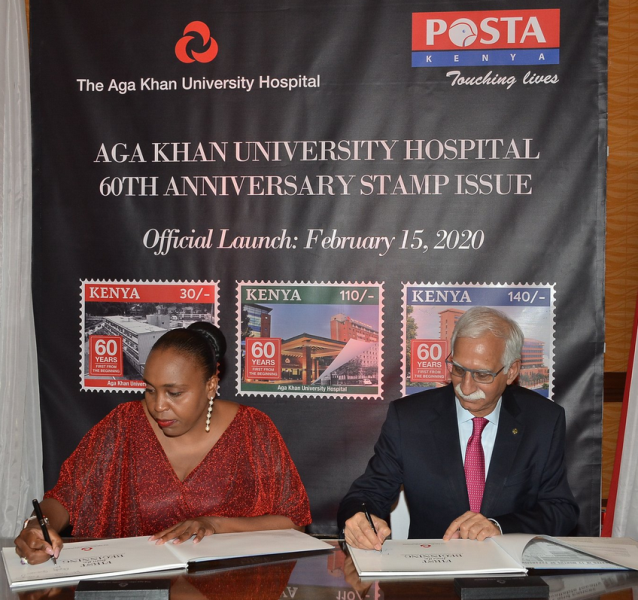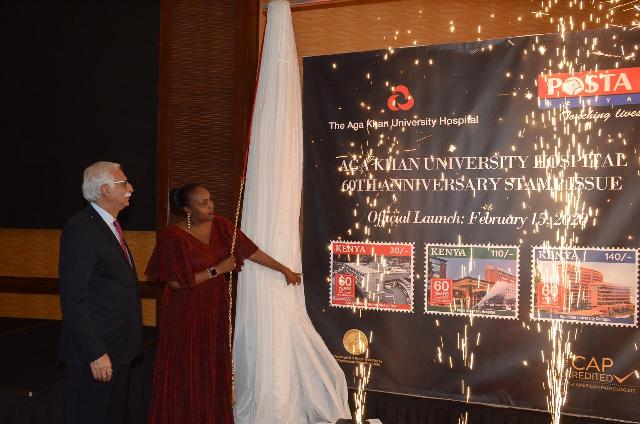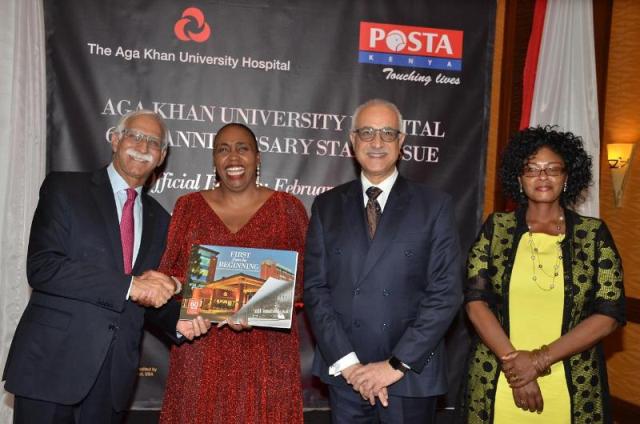2nd March 2015
AKU Convocation 2015 Webcast for the Nairobi, Kenya has ended
Full Video is now on Youtube at:
https://www.youtube.com/watch?v=nKJ6fZ46MbM
H.H. The Aga Khan and the AKU in Nairobi, Kenya
H.H. The Aga Khan and the AKU in Nairobi, Kenya
Last edited by Admin on Fri Jun 11, 2021 9:01 am, edited 5 times in total.
Departure from Nairobi expected Tuesday March 3, 2015 @ 12:30pm
Last edited by Admin on Mon Mar 02, 2015 5:04 am, edited 2 times in total.
2015, March 2: Nairobi, Kenya: H.H. The Aga Khan at the AKU Convocation in NAIROBI - H.H. The Aga Khan announced that soon two more Schools, Leadership and Management as well as Hospitality, Leisure and Tourism will share the building with the Media School of the AKU in Nairobi. Expanded knowledge will be key to progress. The Arusha Campus will open In 2019.

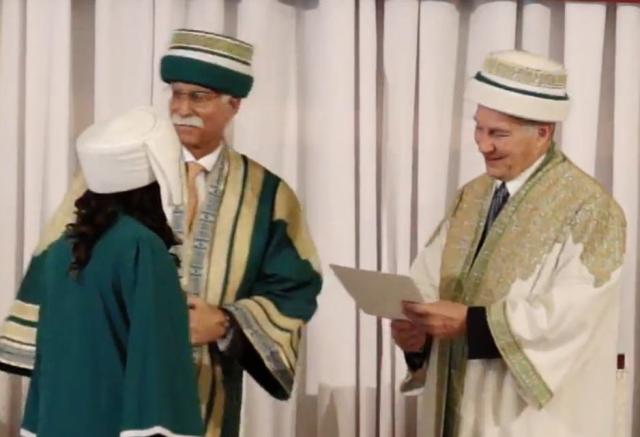










akdn.org/Content/1315
Video of the whole ceremony on Youtube
https://www.youtube.com/watch?v=nKJ6fZ46MbM
Speech by His Highness the Aga Khan at the Aga Khan University Convocation, Nairobi, Kenya
02 March 2015
Bismillah-ir-Rahman-ir-Rahim
Trustees and President of the University,
Members of the Diplomatic Corps,
Deans, Faculty and Staff of the University,
Parents, Donors, Supporters and Distinguished Guests,
and Graduands.
Hamjambo and Karibuni. Hongera, Wanafunzi wote. You see, I’m learning a little Swahili.
What a remarkable day this is, and what a joy it is to be here.
It is a singular pleasure for me because this is the first year that I have been able to attend an AKU convocation in East Africa. That means a lot to me because it was I, as your Chancellor, who first proposed that AKU should expand from Asia to Africa, to meet its chartered international mandate.
In the search for Africa’s development, it seemed clear that expanded knowledge would be the key to progress – as it has been throughout human history. And expanding knowledge, of course, is precisely the mission of AKU.
I know, too, what a special moment it is for all of you. I have always felt there is a certain magical feeling about a graduation ceremony. Think about it, all of you graduands! You walked in here earlier today as students of the Aga Khan University. And you will walk out of here a little later as graduates of the Aga Khan University – and distinguished AKU Alumni. Bravo!
The degree or diploma that you receive today is something you will take with you for the rest of your lives. The education you have achieved here is something that no one can ever take away.
We celebrate each of you graduands. And we also celebrate so many who have contributed to your success: your parents and families, friends and colleagues, and those who have contributed to your University life – faculty, staff, donors, trustees, and community leaders.
Like each of you personally, the University also remembers its heritage today.
That heritage is rooted in the rich history of Islamic intellectual accomplishment – including the work of my own ancestors in Cairo 1000 years ago, when they founded Al Azhar University and the Dar-ul-ilm, the House of Knowledge. This story continued for several centuries, as Muslim centers of culture involved and inspired people of many traditions and faith communities. A respect for diversity – a welcoming, cosmopolitan ethic – has been a hallmark of this heritage – an increasingly relevant legacy in the emerging “borderless” world that President Rasul has so aptly described.
It was this intellectual heritage that inspired my grandfather, as Imam of the Ismaili Muslim community, to make education a top priority. In fact, he started the first Aga Khan School in Africa over 110 years ago in Bagamoyo, Tanzania.
That same legacy was in our minds when we began planning for this new Aga Khan University.
I well remember our early conversations – as early as 1975, to be exact. We asked a host of questions, and a host of wise people responded. Harvard University, yes, my alma mater, developed our blue print. Our biggest question was whether a totally new university in Asia and Africa could achieve sufficient levels of excellence – measured by world standards.
Well, we decided to try it. The Aga Khan University was founded in Karachi in 1983 and it recently celebrated its 30th anniversary. And then, in the year 2000, we expanded into East Africa.
Today, the Aga Khan University remains the only privately supported University with major academic programs on both the Asian and the African continents.
Over a relatively short time span, we have extended our work into eight different countries. We created two degree or diploma programs in the 1980s, two more in the 1990s, and another 21 programs since 2000. Altogether, we have graduated over 12,000 students – over 2000 here in East Africa. And you will soon become the most recent!
Altogether some 1900 nurses have been trained here, almost half of them earning Bachelor of Nursing degrees. So have some 3000 teachers, including 250 with Masters of Education degrees.
But the most important point is the multiplier effect our graduates can have as you pass along your skills and your standards. I think, for example, of AKU programs which have trained almost 1000 head-teachers of secondary schools – in just one year – a striking example of this powerful multiplier potential.
The quality of our programs has been endorsed by many standard setters, including the World Health Organization, the UK College of Physicians and Surgeons and the US Joint Commission International. But the best endorsement, by far, is the success of our graduates, when they take licensing exams, or apply to other schools, or go to work for new employers.
In the end, however, our most important accomplishments are not measured by quantity, but by quality. It’s not so much that 12,000 people were educated at AKU, but rather that ONE person was educated here – and that this individual life-transforming story has happened – now some 12,000 times.
And what for the future? As I have watched the ups and downs of the developing world over the years, one central point has become increasingly clear. More and more, I believe, progress in improving the quality of human life in any setting is linked directly to the quality of Civil Society.
By Civil Society I mean the array of institutions which are neither public, nor profit driven, but which are motivated by voluntary service and committed to the public good. They include, for example, institutions dedicated to cultural enrichment, to independent public information, to protecting the environment and to religious faith. And they include, very importantly, the fields of health and education in which you will make your mark.
A healthy Civil Society is a meritocratic one, where ethics are honored, and excellence is valued. And the great question now confronting us in Africa is how rapidly the institutions of a healthy Civil Society can be established and reinforced.
In this process, AKU’s role can be central.
From the start over 30 years ago, this University’s blueprint envisioned a multi-campus, multi-continental university – comprehensive, broadly integrated, and research-led. That vision, as you have heard, is now coming true.
One milestone along that journey occurred last week when the Tanzania Government presented to me the certificate recognizing the founding charter of the Aga Khan University. It reflected, I believe, AKU’s record of producing outstanding East African graduates.
As we expand our work in Kenya, one of our highest priorities is to achieve international standards of healthcare – especially for non-communicable diseases, such as cancer, heart disease and diabetes. Another special focus will be neuroscience, where the promises of stem cell technology must be brought massively and competently to Africa.
Our overall plan is for a nationally integrated health system, built on the strong foundations already in place at the Aga Khan University Hospital in Nairobi. And our overall goal can be simply stated: we believe that no Kenyan should have to leave the country to seek quality medical care.
All this cannot happen, of course, without an expanded corps of qualified health professionals. And this is where you come in. Our commitment in the years ahead is to educate an ever-growing number of medical graduates – at the undergraduate and post-graduate levels – who can perform, consistently and impressively, at world standards of excellence.
Let me mention some of the other AKU initiatives here in Kenya:
One of the newest is our Institute for Human Development, launched in Nairobi earlier this year, with a focus on children between one and three years of age. It is no secret to you that that is the age where the human brain grows most quickly.
At the same time, our new Graduate School of Media and Communications here in Nairobi will offer professional development courses, as well as a master’s degree program, in the fields of journalism and media management and NGO communication. Specialized reporting skills will be emphasized – in fields such as the Environment, Business and Finance, and the analysis of Social Impacts. The School will serve a broad range of students, from both the public and the private sectors, from traditional media backgrounds and the worlds of advanced information technology.
This new Media and Communications School will share a new building here in Nairobi with two other new Graduate Professional Schools, one in Leadership and Management, and the other in Hospitality, Leisure and Tourism.
Over 15 years, the total investment in Kenya for these programs will exceed US$ 350 million.
We have similar exciting goals throughout East Africa. As the President noted, we will open a new campus in Arusha in 2019 – home for our new Faculty of Arts and Sciences. And we also plan a new campus in Dar es Salaam for our Institute for Educational Development.
In addition to the three new Professional Graduate Schools I just mentioned, we are also planning new Graduate Schools of Government, Civil Society and Public Policy; Economic Growth and Development; Law; and Education.
Each of these Graduate programs is designed to advance a healthy Civil Society – in specific African contexts – and thus quickly accelerate improvement in the quality of human life.
As the East African Community builds politically, so will AKU become increasingly regional. Meanwhile, we will continue to expand our inter-university partnerships – across the world – lending further global credibility to our work, and to your credentials.
This is a long list of initiatives, but not an unrealistic one, any more than it was unrealistic to plan for an intercontinental University three decades ago. Let me emphasize that we see these various units as integrated parts of one University, working closely together – across academic disciplines, across nations and across continents – in our increasingly “borderless” world.
These developments also mean that AKU will continue to be a valuable reference point for you, as Alumni, with its Africa and Asia-specific research, and its Continuing Education opportunities. Even as the AKU story develops, so you can develop your relationship with AKU.
Let me put you on notice. This is not a Farewell Ceremony. In fact, an event like this is often called a “Commencement”, since it marks the beginning of so many great new stories. We hope that you too will share your stories with us, in the days ahead. And we hope that you will continue to be a part of the University’s story.
And so it is that we come together, today, both as grateful inheritors, looking back on an accomplished past – and as eager explorers, looking ahead to an exciting future.
It has been an honor for me to share this day with all of you.
Thank you.
Video of the whole ceremony on Youtube
https://www.youtube.com/watch?v=nKJ6fZ46MbM
Speech by His Highness the Aga Khan at the Aga Khan University Convocation, Nairobi, Kenya
02 March 2015
Bismillah-ir-Rahman-ir-Rahim
Trustees and President of the University,
Members of the Diplomatic Corps,
Deans, Faculty and Staff of the University,
Parents, Donors, Supporters and Distinguished Guests,
and Graduands.
Hamjambo and Karibuni. Hongera, Wanafunzi wote. You see, I’m learning a little Swahili.
What a remarkable day this is, and what a joy it is to be here.
It is a singular pleasure for me because this is the first year that I have been able to attend an AKU convocation in East Africa. That means a lot to me because it was I, as your Chancellor, who first proposed that AKU should expand from Asia to Africa, to meet its chartered international mandate.
In the search for Africa’s development, it seemed clear that expanded knowledge would be the key to progress – as it has been throughout human history. And expanding knowledge, of course, is precisely the mission of AKU.
I know, too, what a special moment it is for all of you. I have always felt there is a certain magical feeling about a graduation ceremony. Think about it, all of you graduands! You walked in here earlier today as students of the Aga Khan University. And you will walk out of here a little later as graduates of the Aga Khan University – and distinguished AKU Alumni. Bravo!
The degree or diploma that you receive today is something you will take with you for the rest of your lives. The education you have achieved here is something that no one can ever take away.
We celebrate each of you graduands. And we also celebrate so many who have contributed to your success: your parents and families, friends and colleagues, and those who have contributed to your University life – faculty, staff, donors, trustees, and community leaders.
Like each of you personally, the University also remembers its heritage today.
That heritage is rooted in the rich history of Islamic intellectual accomplishment – including the work of my own ancestors in Cairo 1000 years ago, when they founded Al Azhar University and the Dar-ul-ilm, the House of Knowledge. This story continued for several centuries, as Muslim centers of culture involved and inspired people of many traditions and faith communities. A respect for diversity – a welcoming, cosmopolitan ethic – has been a hallmark of this heritage – an increasingly relevant legacy in the emerging “borderless” world that President Rasul has so aptly described.
It was this intellectual heritage that inspired my grandfather, as Imam of the Ismaili Muslim community, to make education a top priority. In fact, he started the first Aga Khan School in Africa over 110 years ago in Bagamoyo, Tanzania.
That same legacy was in our minds when we began planning for this new Aga Khan University.
I well remember our early conversations – as early as 1975, to be exact. We asked a host of questions, and a host of wise people responded. Harvard University, yes, my alma mater, developed our blue print. Our biggest question was whether a totally new university in Asia and Africa could achieve sufficient levels of excellence – measured by world standards.
Well, we decided to try it. The Aga Khan University was founded in Karachi in 1983 and it recently celebrated its 30th anniversary. And then, in the year 2000, we expanded into East Africa.
Today, the Aga Khan University remains the only privately supported University with major academic programs on both the Asian and the African continents.
Over a relatively short time span, we have extended our work into eight different countries. We created two degree or diploma programs in the 1980s, two more in the 1990s, and another 21 programs since 2000. Altogether, we have graduated over 12,000 students – over 2000 here in East Africa. And you will soon become the most recent!
Altogether some 1900 nurses have been trained here, almost half of them earning Bachelor of Nursing degrees. So have some 3000 teachers, including 250 with Masters of Education degrees.
But the most important point is the multiplier effect our graduates can have as you pass along your skills and your standards. I think, for example, of AKU programs which have trained almost 1000 head-teachers of secondary schools – in just one year – a striking example of this powerful multiplier potential.
The quality of our programs has been endorsed by many standard setters, including the World Health Organization, the UK College of Physicians and Surgeons and the US Joint Commission International. But the best endorsement, by far, is the success of our graduates, when they take licensing exams, or apply to other schools, or go to work for new employers.
In the end, however, our most important accomplishments are not measured by quantity, but by quality. It’s not so much that 12,000 people were educated at AKU, but rather that ONE person was educated here – and that this individual life-transforming story has happened – now some 12,000 times.
And what for the future? As I have watched the ups and downs of the developing world over the years, one central point has become increasingly clear. More and more, I believe, progress in improving the quality of human life in any setting is linked directly to the quality of Civil Society.
By Civil Society I mean the array of institutions which are neither public, nor profit driven, but which are motivated by voluntary service and committed to the public good. They include, for example, institutions dedicated to cultural enrichment, to independent public information, to protecting the environment and to religious faith. And they include, very importantly, the fields of health and education in which you will make your mark.
A healthy Civil Society is a meritocratic one, where ethics are honored, and excellence is valued. And the great question now confronting us in Africa is how rapidly the institutions of a healthy Civil Society can be established and reinforced.
In this process, AKU’s role can be central.
From the start over 30 years ago, this University’s blueprint envisioned a multi-campus, multi-continental university – comprehensive, broadly integrated, and research-led. That vision, as you have heard, is now coming true.
One milestone along that journey occurred last week when the Tanzania Government presented to me the certificate recognizing the founding charter of the Aga Khan University. It reflected, I believe, AKU’s record of producing outstanding East African graduates.
As we expand our work in Kenya, one of our highest priorities is to achieve international standards of healthcare – especially for non-communicable diseases, such as cancer, heart disease and diabetes. Another special focus will be neuroscience, where the promises of stem cell technology must be brought massively and competently to Africa.
Our overall plan is for a nationally integrated health system, built on the strong foundations already in place at the Aga Khan University Hospital in Nairobi. And our overall goal can be simply stated: we believe that no Kenyan should have to leave the country to seek quality medical care.
All this cannot happen, of course, without an expanded corps of qualified health professionals. And this is where you come in. Our commitment in the years ahead is to educate an ever-growing number of medical graduates – at the undergraduate and post-graduate levels – who can perform, consistently and impressively, at world standards of excellence.
Let me mention some of the other AKU initiatives here in Kenya:
One of the newest is our Institute for Human Development, launched in Nairobi earlier this year, with a focus on children between one and three years of age. It is no secret to you that that is the age where the human brain grows most quickly.
At the same time, our new Graduate School of Media and Communications here in Nairobi will offer professional development courses, as well as a master’s degree program, in the fields of journalism and media management and NGO communication. Specialized reporting skills will be emphasized – in fields such as the Environment, Business and Finance, and the analysis of Social Impacts. The School will serve a broad range of students, from both the public and the private sectors, from traditional media backgrounds and the worlds of advanced information technology.
This new Media and Communications School will share a new building here in Nairobi with two other new Graduate Professional Schools, one in Leadership and Management, and the other in Hospitality, Leisure and Tourism.
Over 15 years, the total investment in Kenya for these programs will exceed US$ 350 million.
We have similar exciting goals throughout East Africa. As the President noted, we will open a new campus in Arusha in 2019 – home for our new Faculty of Arts and Sciences. And we also plan a new campus in Dar es Salaam for our Institute for Educational Development.
In addition to the three new Professional Graduate Schools I just mentioned, we are also planning new Graduate Schools of Government, Civil Society and Public Policy; Economic Growth and Development; Law; and Education.
Each of these Graduate programs is designed to advance a healthy Civil Society – in specific African contexts – and thus quickly accelerate improvement in the quality of human life.
As the East African Community builds politically, so will AKU become increasingly regional. Meanwhile, we will continue to expand our inter-university partnerships – across the world – lending further global credibility to our work, and to your credentials.
This is a long list of initiatives, but not an unrealistic one, any more than it was unrealistic to plan for an intercontinental University three decades ago. Let me emphasize that we see these various units as integrated parts of one University, working closely together – across academic disciplines, across nations and across continents – in our increasingly “borderless” world.
These developments also mean that AKU will continue to be a valuable reference point for you, as Alumni, with its Africa and Asia-specific research, and its Continuing Education opportunities. Even as the AKU story develops, so you can develop your relationship with AKU.
Let me put you on notice. This is not a Farewell Ceremony. In fact, an event like this is often called a “Commencement”, since it marks the beginning of so many great new stories. We hope that you too will share your stories with us, in the days ahead. And we hope that you will continue to be a part of the University’s story.
And so it is that we come together, today, both as grateful inheritors, looking back on an accomplished past – and as eager explorers, looking ahead to an exciting future.
It has been an honor for me to share this day with all of you.
Thank you.
AKU Center Nairobi, Kenya - Charter 2021-06-11
Friday, June 11th 2021 - Charter Granting Ceremony and Inauguration of the Aga Khan University Centre, Nairobi
Speakers: Chancellor, His Highness the Aga Khan, H.E. President Uhuru Kenyatta, Chairman of CUE, Professor Chacha Nyaigotti-Chacha, President of Aga Khan University, Mr. Firoz Rasul
His Excellency President Uhuru Kenyatta signed the granting of the Charter and unveiled the plaque. Mowlana Hazar Imam participated via video-conference virtually and the whole program was live webcast.
Speech VIDEO available here:
https://youtu.be/DwwEcV4dc3Q
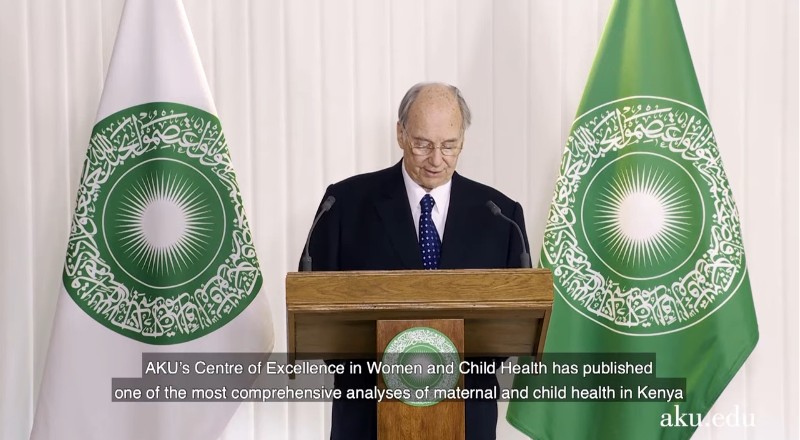
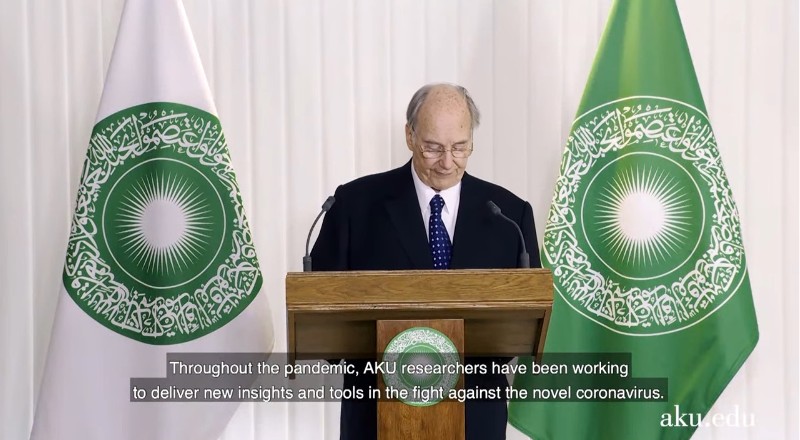
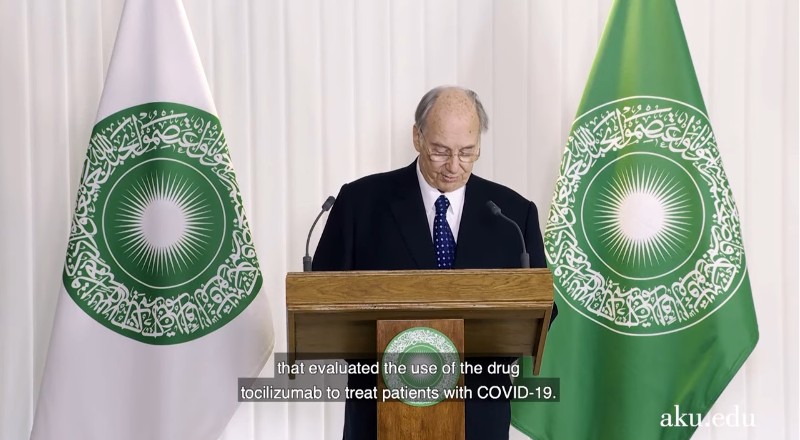
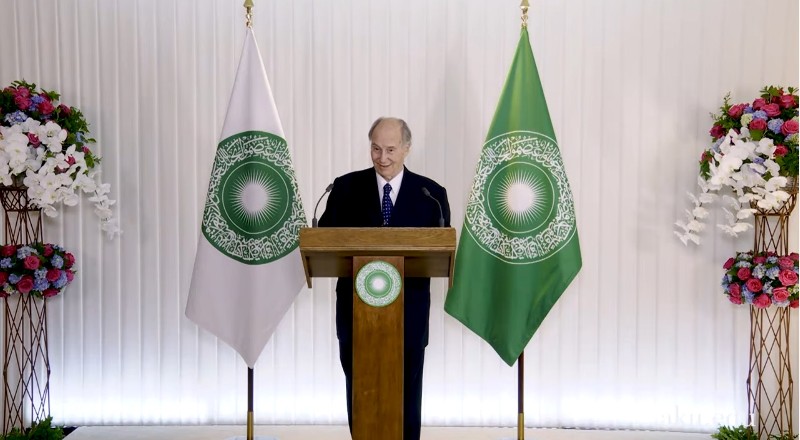
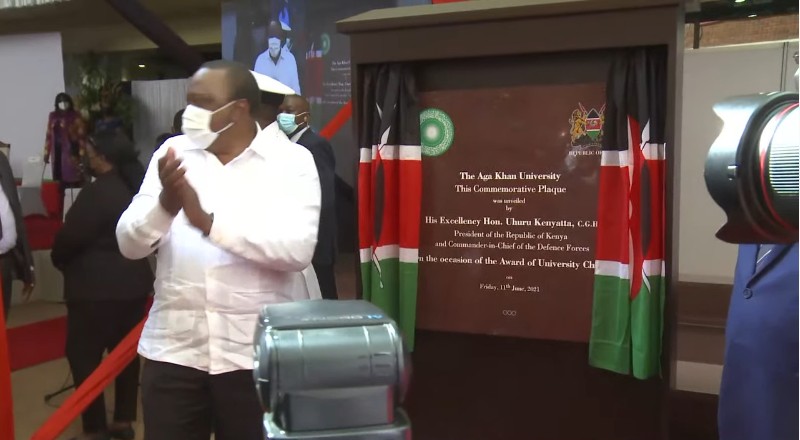

Speech VIDEO available here:
https://youtu.be/DwwEcV4dc3Q
.
Speakers: Chancellor, His Highness the Aga Khan, H.E. President Uhuru Kenyatta, Chairman of CUE, Professor Chacha Nyaigotti-Chacha, President of Aga Khan University, Mr. Firoz Rasul
His Excellency President Uhuru Kenyatta signed the granting of the Charter and unveiled the plaque. Mowlana Hazar Imam participated via video-conference virtually and the whole program was live webcast.
Speech VIDEO available here:
https://youtu.be/DwwEcV4dc3Q






Speech VIDEO available here:
https://youtu.be/DwwEcV4dc3Q
.
Speech Aga Khan Nairobi AKU Center 2021-06-11
https://www.akdn.org/speech/his-highnes ... y-aga-khan
Speech by His Highness the Aga Khan at the Kenya Charter Granting Ceremony of the Aga Khan University
Nairobi, Kenya (11 June 2021)
Speech VIDEO available here:
https://youtu.be/DwwEcV4dc3Q
Bismillah-ir-Rahman-ir-Rahim
Your Excellency President Uhuru Kenyatta
Professor George Magoha, Cabinet Secretary for Education
Professor Chacha, Chairman of the Commission for University Education
Excellencies
Distinguished guests, ladies and gentlemen
It is with the greatest satisfaction and the deepest gratitude that I accept the Kenya Charter of the Aga Khan University. My only regret is that, due to the pandemic, I cannot be present in person to receive the instruments of authority, and to celebrate this momentous occasion in the University’s history.
The Charter details AKU’s functions, powers, obligations, and governance. But it is more than a legal document. It is a vote of confidence in AKU and all those who are part of it – our faculty, our staff, administration, students, alumni, friends, and supporters.
Your Excellency – Thank you for your confidence in the Aga Khan University. Thank you for creating an enabling environment that has allowed AKU to flourish, and for recognising that private institutions can play a vital role in promoting public welfare.
I would also like to thank the Commission for University Education, which has managed the difficult feat of acting as both a demanding regulator and a supportive partner. AKU is a better university because of the Commission’s efforts to improve the quality of tertiary education in Kenya.
In this venue we see dramatic confirmation that the University is indeed thriving. Our new University Centre is the soaring embodiment of AKU’s commitment to Kenya, and determination to ensure that its people have access to the very best in higher education and health care. It is also a testament to the power of giving. The construction of the Centre was made possible by the extraordinary generosity of a number of individuals and families who are joining us today, and whose names will be permanently engraved on its walls and glass balustrades. I am profoundly grateful for their support, as is the entire AKU community.
While its Charter is new, AKU is a firmly established institution in Kenya: It has been operating here since 2002, under a letter of interim authority from the Government. Moreover, as an agency of the Aga Khan Development Network, the University is part of a wide-ranging effort to improve quality of life in East Africa, and that dates back more than 100 years, to the schools founded by my grandfather, Sir Sultan Mahomed Shah Aga Khan, in the early 20th century.
Milestones in the Network’s history include the founding of enduring institutions such as Jubilee Insurance, the Aga Khan Hospital in Nairobi – now the Aga Khan University Hospital – and the Nation Media Group, all of which have now been serving Kenya for more than 60 years.
Today, I think we can say without exaggeration that AKDN and its agencies, including the Aga Khan University, are part of the fabric of life in Kenya and East Africa.
What then has the University achieved in its first two decades? And what does its future hold? Let us begin with its accomplishments thus far.
First, the University has educated much-needed leaders.
In total, nearly 4,000 students have graduated from AKU in East Africa. Among them are more than 1,400 Kenyan nurses, doctors, educators, and journalists – 70 percent of whom, I would note, are women.
Across the country and the region, AKU alumni are leading departments, institutions, and professional organisations. They are founding schools and clinics. They are winning awards, including Kenya’s 2018 Teacher of the Year Award. They are raising standards in both the public and the private sectors, and in rural areas as well as cities.
Second, AKU has developed into an institution capable of delivering problem-solving knowledge, and of sharing its expertise with other organisations.
AKU’s Centre of Excellence in Women and Child Health has published one of the most comprehensive analyses of maternal and child health in Kenya and is working with its fellow AKDN agencies to help government health facilities in Kilifi and Kisii counties to improve health for thousands of women and children.
Our Institute for Human Development has trained hundreds of professionals in the science of early childhood development and is conducting a multi-faceted research and intervention project to support child development in underprivileged communities.
The University’s new Cancer Centre is one of the few centres in Sub-Saharan Africa equipped to conduct cancer clinical trials. As such, it will bring new treatments to cancer patients that would otherwise be unavailable in Kenya.
Throughout the pandemic, AKU researchers have been working to deliver new insights and tools in the fight against the novel coronavirus. For example, the University was one of only two institutions in Africa to contribute to an international clinical trial that evaluated the use of the drug tocilizumab to treat patients with COVID-19. It is now part of the standard treatment protocol worldwide.
AKU experts have also provided advice and training on caring for patients with COVID-19 to government clinics and hospitals.
As these and many other efforts demonstrate, AKU is no ivory tower. It is deeply concerned with, and connected to, the lives of ordinary Kenyans.
Third, the University has expanded access to high-quality health care, and raised standards in health-care delivery.
The Aga Khan University Hospital, Kenya’s only internationally accredited teaching hospital and its 45 outreach clinics serve almost every major centre in the country. The Hospital also provides free health screening to tens of thousands of individuals through its medical camps.
During the pandemic, the Hospital has treated over 2,000 seriously ill COVID patients, conducted more than 76,000 tests for the coronavirus and vaccinated over 10,000 people.
All this was possible because we are the only private institution in Kenya to train specialist doctors who provide the country with much needed medical knowledge and skills. We also create opportunities for working nurses to upgrade their training to earn degrees at an international standard. Not to mention, the master teachers we develop to improve schools and the journalists whose capabilities we raise to be able to report using multiple platforms, including digital media.
In short, as called for in its Charter, Aga Khan University has “prepared individuals for constructive and exemplary leadership…responded to identified needs in the countries it serves…and provided meaningful contributions to society.”
In the years to come, it will continue to do so.
Charter in hand and newly housed in a dynamic urban campus unlike any other in the region, the University will launch new programmes in nursing and medicine. And its new Nairobi-based Brain and Mind Institute will undertake cutting-edge research aimed at improving mental health, especially among women, adolescents, and disadvantaged populations.
As its student body and its faculty grow in size, its visibility and impact will increase, new programmes will come online, much about the Aga Khan University will change. What will not change is its principle of uncompromising quality and its mission of improving quality of life in Kenya.
I look forward to continuing to pursue that mission together with the University’s trustees, faculty, staff, students, alumni, volunteers, donors, and partners; in accordance with the Charter we have been granted today; and with the support and encouragement of the Government of Kenya.
Thank you very much.
Speech by His Highness the Aga Khan at the Kenya Charter Granting Ceremony of the Aga Khan University
Nairobi, Kenya (11 June 2021)
Speech VIDEO available here:
https://youtu.be/DwwEcV4dc3Q
Bismillah-ir-Rahman-ir-Rahim
Your Excellency President Uhuru Kenyatta
Professor George Magoha, Cabinet Secretary for Education
Professor Chacha, Chairman of the Commission for University Education
Excellencies
Distinguished guests, ladies and gentlemen
It is with the greatest satisfaction and the deepest gratitude that I accept the Kenya Charter of the Aga Khan University. My only regret is that, due to the pandemic, I cannot be present in person to receive the instruments of authority, and to celebrate this momentous occasion in the University’s history.
The Charter details AKU’s functions, powers, obligations, and governance. But it is more than a legal document. It is a vote of confidence in AKU and all those who are part of it – our faculty, our staff, administration, students, alumni, friends, and supporters.
Your Excellency – Thank you for your confidence in the Aga Khan University. Thank you for creating an enabling environment that has allowed AKU to flourish, and for recognising that private institutions can play a vital role in promoting public welfare.
I would also like to thank the Commission for University Education, which has managed the difficult feat of acting as both a demanding regulator and a supportive partner. AKU is a better university because of the Commission’s efforts to improve the quality of tertiary education in Kenya.
In this venue we see dramatic confirmation that the University is indeed thriving. Our new University Centre is the soaring embodiment of AKU’s commitment to Kenya, and determination to ensure that its people have access to the very best in higher education and health care. It is also a testament to the power of giving. The construction of the Centre was made possible by the extraordinary generosity of a number of individuals and families who are joining us today, and whose names will be permanently engraved on its walls and glass balustrades. I am profoundly grateful for their support, as is the entire AKU community.
While its Charter is new, AKU is a firmly established institution in Kenya: It has been operating here since 2002, under a letter of interim authority from the Government. Moreover, as an agency of the Aga Khan Development Network, the University is part of a wide-ranging effort to improve quality of life in East Africa, and that dates back more than 100 years, to the schools founded by my grandfather, Sir Sultan Mahomed Shah Aga Khan, in the early 20th century.
Milestones in the Network’s history include the founding of enduring institutions such as Jubilee Insurance, the Aga Khan Hospital in Nairobi – now the Aga Khan University Hospital – and the Nation Media Group, all of which have now been serving Kenya for more than 60 years.
Today, I think we can say without exaggeration that AKDN and its agencies, including the Aga Khan University, are part of the fabric of life in Kenya and East Africa.
What then has the University achieved in its first two decades? And what does its future hold? Let us begin with its accomplishments thus far.
First, the University has educated much-needed leaders.
In total, nearly 4,000 students have graduated from AKU in East Africa. Among them are more than 1,400 Kenyan nurses, doctors, educators, and journalists – 70 percent of whom, I would note, are women.
Across the country and the region, AKU alumni are leading departments, institutions, and professional organisations. They are founding schools and clinics. They are winning awards, including Kenya’s 2018 Teacher of the Year Award. They are raising standards in both the public and the private sectors, and in rural areas as well as cities.
Second, AKU has developed into an institution capable of delivering problem-solving knowledge, and of sharing its expertise with other organisations.
AKU’s Centre of Excellence in Women and Child Health has published one of the most comprehensive analyses of maternal and child health in Kenya and is working with its fellow AKDN agencies to help government health facilities in Kilifi and Kisii counties to improve health for thousands of women and children.
Our Institute for Human Development has trained hundreds of professionals in the science of early childhood development and is conducting a multi-faceted research and intervention project to support child development in underprivileged communities.
The University’s new Cancer Centre is one of the few centres in Sub-Saharan Africa equipped to conduct cancer clinical trials. As such, it will bring new treatments to cancer patients that would otherwise be unavailable in Kenya.
Throughout the pandemic, AKU researchers have been working to deliver new insights and tools in the fight against the novel coronavirus. For example, the University was one of only two institutions in Africa to contribute to an international clinical trial that evaluated the use of the drug tocilizumab to treat patients with COVID-19. It is now part of the standard treatment protocol worldwide.
AKU experts have also provided advice and training on caring for patients with COVID-19 to government clinics and hospitals.
As these and many other efforts demonstrate, AKU is no ivory tower. It is deeply concerned with, and connected to, the lives of ordinary Kenyans.
Third, the University has expanded access to high-quality health care, and raised standards in health-care delivery.
The Aga Khan University Hospital, Kenya’s only internationally accredited teaching hospital and its 45 outreach clinics serve almost every major centre in the country. The Hospital also provides free health screening to tens of thousands of individuals through its medical camps.
During the pandemic, the Hospital has treated over 2,000 seriously ill COVID patients, conducted more than 76,000 tests for the coronavirus and vaccinated over 10,000 people.
All this was possible because we are the only private institution in Kenya to train specialist doctors who provide the country with much needed medical knowledge and skills. We also create opportunities for working nurses to upgrade their training to earn degrees at an international standard. Not to mention, the master teachers we develop to improve schools and the journalists whose capabilities we raise to be able to report using multiple platforms, including digital media.
In short, as called for in its Charter, Aga Khan University has “prepared individuals for constructive and exemplary leadership…responded to identified needs in the countries it serves…and provided meaningful contributions to society.”
In the years to come, it will continue to do so.
Charter in hand and newly housed in a dynamic urban campus unlike any other in the region, the University will launch new programmes in nursing and medicine. And its new Nairobi-based Brain and Mind Institute will undertake cutting-edge research aimed at improving mental health, especially among women, adolescents, and disadvantaged populations.
As its student body and its faculty grow in size, its visibility and impact will increase, new programmes will come online, much about the Aga Khan University will change. What will not change is its principle of uncompromising quality and its mission of improving quality of life in Kenya.
I look forward to continuing to pursue that mission together with the University’s trustees, faculty, staff, students, alumni, volunteers, donors, and partners; in accordance with the Charter we have been granted today; and with the support and encouragement of the Government of Kenya.
Thank you very much.
AKU Center Nairobi Charter
https://www.standardmedia.co.ke/educati ... iversities
Invest in research and training, Uhuru tells universities
EDUCATION
By PSCU | June 11th 2021
resident Uhuru Kenyatta has asked universities to invest in research and training that support Kenya's new Competency-Based Curriculum (CBC).
He spoke in Nairobi when he awarded a charter to the Aga Khan University-Kenya (AKU). Kenyatta urged universities to concentrate on producing graduates who can tackle global challenges and make the world a better place.
“The Competence-Based Curriculum is a revolutionary step we took as a country to provide our learners with twenty-first-century practical skills relevant to the needs of the present world,” the President said.
The Head of State reminded Kenyan universities to ensure that they offer quality education.
“You must strive to remain compliant to both the programmatic and institutional standards set by our professional regulatory bodies such as the Commission for University Education,” President Kenyatta said.
At the same time, the President directed regulatory institutions in the education sector to execute their mandate fully in order to ensure the quality of university education is not compromised.
“Regulatory standards are not mere exercises in box-ticking. They are the lifeblood of a vital process that ensures that learning delivers tangible results for both the learner as well as the nation,” the President emphasized.
On research, the President challenged universities to be at the forefront in providing solutions to emerging challenges such as the COVID-19 pandemic.
During the event, President Kenyatta also inaugurated the Aga Khan University’s new Kshs 5 billion ultra-modern building. The building will be the university’s main campus in Kenya, housing its graduate school of Media and Communications, Medical College, School of Nursing and Midwifery, Institute for Human Development as well as the Brain and Mind Institute among other programmes.
His Highness the Aga Khan, who is the Chancellor of the Aga Khan University, addressed the occasion via video link, saying the awarding of charter to AKU is a vote of confidence in the university.
He thanked President Kenyatta’s leadership for creating an enabling environment that has allowed private universities in Kenya to flourish.
Education CS Prof George Magoha, Commission for University Education (CUE) Chairman Prof Chacha Nyaigoti Chacha, CUE Secretary Prof Mwenda Ntarangwi as well as the Aga Khan University’s Vice Chancellor Dr Firoz Rasul spoke during the occasion.
With the award of the charter, the Aga Khan University becomes Kenya's 21st private chartered university.
Invest in research and training, Uhuru tells universities
EDUCATION
By PSCU | June 11th 2021
resident Uhuru Kenyatta has asked universities to invest in research and training that support Kenya's new Competency-Based Curriculum (CBC).
He spoke in Nairobi when he awarded a charter to the Aga Khan University-Kenya (AKU). Kenyatta urged universities to concentrate on producing graduates who can tackle global challenges and make the world a better place.
“The Competence-Based Curriculum is a revolutionary step we took as a country to provide our learners with twenty-first-century practical skills relevant to the needs of the present world,” the President said.
The Head of State reminded Kenyan universities to ensure that they offer quality education.
“You must strive to remain compliant to both the programmatic and institutional standards set by our professional regulatory bodies such as the Commission for University Education,” President Kenyatta said.
At the same time, the President directed regulatory institutions in the education sector to execute their mandate fully in order to ensure the quality of university education is not compromised.
“Regulatory standards are not mere exercises in box-ticking. They are the lifeblood of a vital process that ensures that learning delivers tangible results for both the learner as well as the nation,” the President emphasized.
On research, the President challenged universities to be at the forefront in providing solutions to emerging challenges such as the COVID-19 pandemic.
During the event, President Kenyatta also inaugurated the Aga Khan University’s new Kshs 5 billion ultra-modern building. The building will be the university’s main campus in Kenya, housing its graduate school of Media and Communications, Medical College, School of Nursing and Midwifery, Institute for Human Development as well as the Brain and Mind Institute among other programmes.
His Highness the Aga Khan, who is the Chancellor of the Aga Khan University, addressed the occasion via video link, saying the awarding of charter to AKU is a vote of confidence in the university.
He thanked President Kenyatta’s leadership for creating an enabling environment that has allowed private universities in Kenya to flourish.
Education CS Prof George Magoha, Commission for University Education (CUE) Chairman Prof Chacha Nyaigoti Chacha, CUE Secretary Prof Mwenda Ntarangwi as well as the Aga Khan University’s Vice Chancellor Dr Firoz Rasul spoke during the occasion.
With the award of the charter, the Aga Khan University becomes Kenya's 21st private chartered university.

